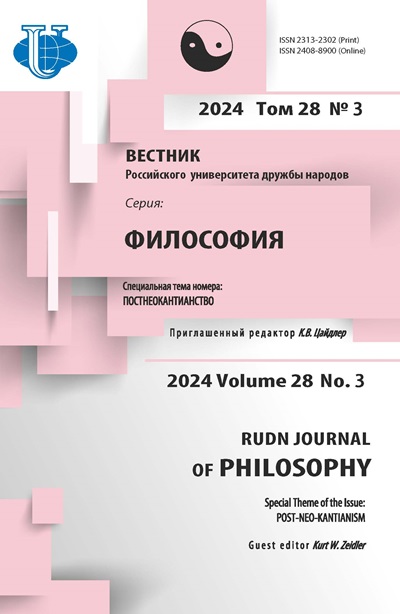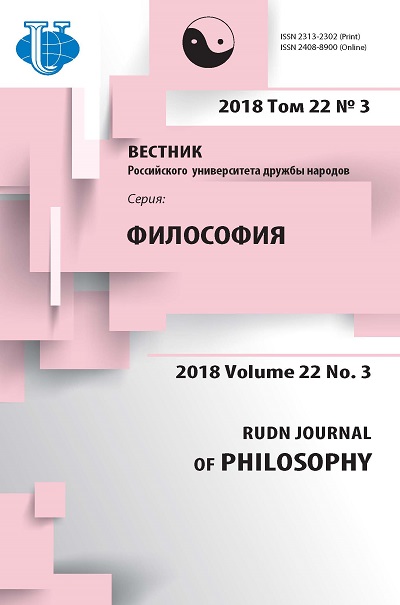THE POSSIBILITY OF CROSS-CULTURAL UNDERSTANDING IN THE HISTORY OF PHILOSOPHY: THE TOPICAL POSITIONS
- Authors: Lvov AA1
-
Affiliations:
- Saint Petersburg State University
- Issue: Vol 22, No 3 (2018)
- Pages: 365-376
- Section: HISTORY OF PHILOSOPHY
- URL: https://journals.rudn.ru/philosophy/article/view/19333
- DOI: https://doi.org/10.22363/2313-2302-2018-22-3-365-376
Cite item
Full Text
Abstract
The historians of philosophy in Russia and abroad have become frequently challenged with the demand for rethinking and reconsideration the traditionally accepted views on their trade, the very possibility of different traditions of philosophical thought to interact, and as a result - to revisit the very definition of philosophy. The topical historical and philosophical discussions deal with a whole combination of issues, that concern fruitful and constructive dialogue between different cultures, the possibility of mutual enrichment with values and ideas among formerly distinguished schools, tendencies and movements in the certain regional philosophies. The trend to integrate oriental and western styles of thinking is at the cutting edge of the historical and philosophical investigations, especially of comparative and intercultural philosophies, as well as the philosophy of language. However, there are those who keep doubting both about the adequate and correct correlation between the western scientific philosophy and oriental type of wisdom, and the consistency of the history of western philosophy as such, and they are not few. In these terms, in historical and philosophical discussions one may reveal both historical and epistemological arguments for the positions of the scholars. The paper observes the opinions of the investigators and historians of oriental and western styles of philosophy, considers their positions and watches the consistency of their logic and argumentation they develop. Besides, it is of a high importance to demonstrate that they are the historians of philosophy who possess the efficient apparatus to found the possibility of constructive and meaningful dialogue between different cultures of philosophizing. From this perspective, the historian of philosophy becomes a kind of a selectionist of thought, who analyzes the ability of this or that philosophical culture to grow in a foreign breeding ground.
About the authors
A A Lvov
Saint Petersburg State University
Author for correspondence.
Email: a.lvov@spbu.ru
кандидат философских наук, старший преподаватель кафедры онтологии и теории познания Санкт-Петербургского государственного университета
Universitetskaya Emb., 7-9, St. Petersburg, Russia, 199034References
- Hegel G.W.F. Lektsii po istorii filosopfii. St. Petersbirg; Nauka; 2006. 349 p. (In Russ.)
- Husserl E. Krisis Evropeiskikh nauk. St. Petesburg: Izdatel’stvo “Vladimir Dal’”; 2004. 399 p. (In Russ.)
- Heidegger M. Chto eto takoe — filosofiya? Voprosy filosofii. 1993; 8:113—123. (In Russ.)
- Balslev A.N. Philosophy and Cross-Cultural Conversation: Some Comments on the Project of comparative Philosophy. Metaphilosophy. 1997; 22(4):359—370.
- Adams EM. The Mission of Philosophy Today. Metaphilosophy. 2000; 31(4):349—364.
- Schneewind JB. Globalization in the History of Philosophy. Journal of the History of Ideas. 2005; 66(2):169—178.
- Lai C, Masson M. Studying Chinese Philosophy: Turn-of-the-Century’s Challenges. La philosophie chinoise moderne. Modern Chinese Philosophy. 2005;59(232):181—198.
- Erlenbusch V. Being a Foreigner: A Taxonomy. Hypatia. 2018;33(2):307—324.
- Shusterman R. Internationalism in Philosophy: Models, Motives and Problems. Metaphilosophy. 1997;28(4):289—301.
- Goulah J. Daisaku Ikeda and Value-Creative Dialogue: A new current in interculturalism and educational philosophy. Educational Philosophy and Theory. 2012;44(9):997—1009.
- Tucker A. The Future of the Philosophy of Historiography. History and Theory. 2001; 40(1):37—56.
- Lachs J. The Future of Philosophy. Proceedings and Addresses of the American Philosophical Association. 2004;78(2):5—14.
- Sorgner LS. Philosophy as “Intellectual War of Values”. Philosophy’s Future: The Problem of Philosophical Progress. ed. R. Blackford, D. Broderick. John Wiley & Sons; 2017. 249 p.
- Jiang X. The Study of Chinese Philosophy in the English Speaking World. Philosophy Compass. Vol. 3(6):168—179.
- Derrida J. Est’ mesto perevodu. Filosofiya na natsional’nom yazyke (k “slovesnosti na frantsuzskom”). Logos. 2011;84 (5—6):114—133. (In Russ.)
- Connolly T. Introduction: Chinese Philosophy qua Philosophy. Journal of Chinese Philosophy. 2013;40( 3—4):377—380.
- Defoort C. Is There Such Thing as Chinese Philosophy? Arguments of an Implicit Debate. Philosophy East and West. 2001;51( 3):393—413.
- Ni P. The changing Status of Chinese Philosophy. Journal of Chinese Philosophy. 2013; 40(3—4):583—600.
- Karelova L.B. Filosofsko-antropologicheskie vzglyady Tetsuro Watsuji v kontekste ego polemiki s zapadnoevropeiskoi mysl’yu pervoi poloviny XX v. Istorilo-filosofskii ezhegodnik. 2010;(2009):323—341. (In Russ.)
- Karelova LB. Problema evropotsentrizma i orientalizma v sovremennoi Rossii. Tetradi po konservatizmu. 2015;(5):152—158. (In Russ.)
- L’vov AA. Metodologicheskie poiski v sovremennoi istorii filosofii. Diskurs. 2017;(5.):10—16. (In Russ.)
- Yu J. Soul and Self: Comparing Chinese Philosophy and Greek Philosophy. Philosophy Compass. 2008; 4(3):604—618.
- Stepanyants МТ. Ot evrotsentrizma k mezhkul’turnoi filosofii. Voprosy filosofii. 2015. № 10. P. 150—162. (In Russ.)
- Filosofiya i nauka v kul’turakh vostoka i zapada. ed. М. Т. Stepanyants. Мoscow: Nauka—Vost. Lit., 2013. 354 p. (In Russ.)In 4 Vols. (In Russ.)
















